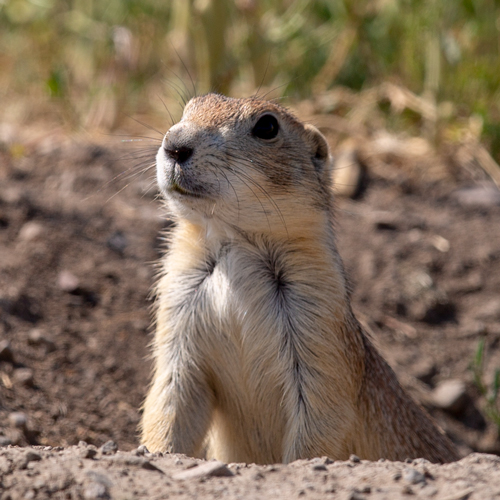The morning is cold but the day ends with temperatures warm enough to encourage mosquitoes. As the Little Rocky and Bears Paw mountains come into view, Lewis describes prairie dogs and the purgative effect experienced when drinking from local streams. At dinner, an out-of-control fire burns one of the enlisted men‘s shot pouch, powder horn, and rifle stock.
Weather Cold, River Rising
by Yellowstone Public Radio[1]Originally aired weekdays by Yellowstone Public Radio during the Bicentennial observance of 2003-2006. Narrated by Hal Hansen. Scripts by Whit Hansen and Ed Jacobson. Produced by Leni Holliman. © … Continue reading
Little Rocky and Bears Paw Mountains
© 25 July 2013 by Kristopher K. Townsend. Permission to use granted under the Creative Commons Attribution-Share Alike 4.0 International license.
Little Rocky Mountains
a Mountain which appears to be 60 or 70 miles long bearing E. & W. is about 25 miles distant from this river on the Stard Side.
—John Ordway
Ice and Mosquitoes
the Thurmomiter Stood at the freezeing point this morning wind S. W. the water freezes on the ore Ice on the edge of the river . . . . the after part of this day was warm & the Musquetoes troublesome
—John Ordway
Purgative Waters
The water is absorbed by the earth near the river and of course appear dry; they afford but little water at any rate, and that is so strongly impregnated with these salts that it is unfit for uce; all the wild anamals appear fond of this water; I have tryed it by way of experiment & find it moderately pergative, but painfull to the intestens in it’s opperation.
—Meriwether Lewis
Prairie Dog
Cynomys ludovicianus
© 20 July 2017 by Kristopher K. Townsend. Permission to use granted under the Creative Commons Attribution-Share Alike 4.0 International license.
Prairie Dog Observations
just above the entrance of Teapot Creek on the stard. there is a large assemblage of the burrows of the Burrowing Squirrel [Prairie Dogs] they generally seelect a south or a south Easterly exposure for their residence, and never visit the brooks or river for water; I am astonished how this anamal exists as it dose without water
—Meriwether Lewis
Out-of-control Fire
we halted and made fire to dine at a timbred bottom on N. S. one of the hunters took his rifle & bullitt pouch on Shore the fire broke out into the woods, and burned up his shot pouch powder horn & the stalk of his rifle.
—Joseph Whitehouse
Other Sightings
Weather Diary
State of thermometer at rise
Weather Wind at rise
State of thermometer at 4 P. M. Weather Wind at 4 P. M. State of the river 32 [above 0] fair S W 54 [above 0] fair S W fallen ½ in. hard frost last night; ice in the eddy water along the shore, and the water friezed on the oars this morning. Strawburies in bloom.
—Meriwether Lewis[2]To assist the reader, the editor of this web page has omitted the date column, merged the “State of the river” columns, and spelled out some abbreviations.
Notes
| ↑1 | Originally aired weekdays by Yellowstone Public Radio during the Bicentennial observance of 2003-2006. Narrated by Hal Hansen. Scripts by Whit Hansen and Ed Jacobson. Produced by Leni Holliman. © 2003 by Yellowstone Public Radio. |
|---|---|
| ↑2 | To assist the reader, the editor of this web page has omitted the date column, merged the “State of the river” columns, and spelled out some abbreviations. |


